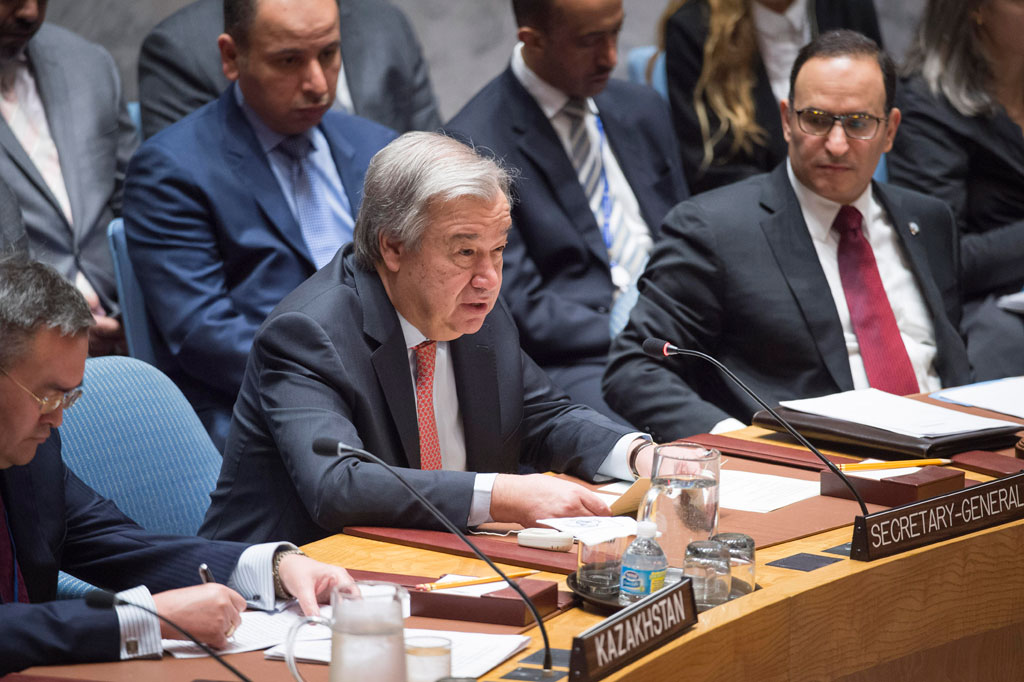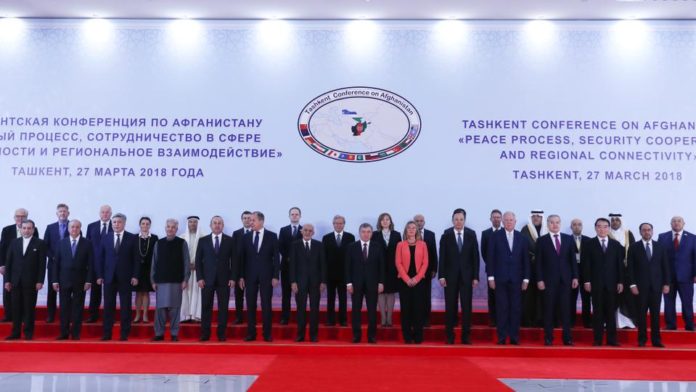The Republic of Uzbekistan recently arranged an international conference titled “Afghanistan: Peace Process, Security Cooperation and Regional Connectivity” in which more than 23 countries and organizations declared their support for direct talks between the Kabul government and the Taliban to end the 16-year conflict in Afghanistan. A joint declaration was issued at the end of the conference showing strong backing for the National Unity Government’s offer to launch direct talks with the Taliban without any preconditions. They also called upon the Taliban to accept this offer for a peace process that is Afghan-led and Afghan-owned. One of the key priorities of Uzbekistan has been to bring peace and development in Afghanistan through a regional formula since the last many years.
Uzbekistan’s Efforts for Regional Peace through Regionalism
Uzbekistan has been advocating a regional approach to put an end to political chaos, deteriorating law and order situation and the last but not the least, severe ethnicity in Afghanistan. Uzbekistan’s president H.E. Shavkat Mirziyoev firmly believes in regionalism and since the beginning of his presidency he has tried to resolve all conflicting issues with all regional countries through “dialogue, diplomacy and development”. The conference also reflected his vision of regional peace, greater regional connectivity and resolution of regional conflict with regional imputes.
Honorable Dignitaries
The conference was attended by Afghan President Ashraf Ghani, Pakistani Foreign Minister Khawaja Asif, European Union foreign-policy chief Federica Mogherini and a number of foreign ministers including Sergei Lavrov of Russia, Wang Yi of China, and Turkey’s Mevlut Cavusoglu. The United States was represented by Undersecretary of State for Political Affairs Thomas Shannon.
Statement of Foreign Minister of Pakistan
Pakistan’s FM Khawaja Asif was of the view that bringing Taliban to the negotiating table and establishing peace and stability in Afghanistan is a collective responsibility of the international community. He said Pakistan has been constantly stressing for the resolution of Afghan conflict through a political settlement and emphasized the need of a regional approach for lasting peace and stability in Afghanistan and the region. He reconfirmed Pakistan’s support for Afghan President Ashraf Ghani’s national peace and reconciliation plan unveiled during the Kabul process meeting and his offer of peace talks to Taliban under an Afghan-led and owned process. He said there is a need of exerting collective pressure on Taliban to shun violence and join the peace process. The foreign minister expressed great concern over unchecked proliferation of Daesh and phenomenal increase in drug production in Afghanistan. He emphasized the need for cooperation between Afghanistan and its neighbours to prevent cross-border movement of terrorists and criminal networks.
Afghanistan’s Offer to Taliban
Before the conference President of Afghanistan offered to allow the Taliban to establish itself as a political party and said he would work to remove sanctions on the militant group, among other incentives if it joined the government in peace negotiations. In return, the militants would have to recognize the Kabul government and respect the rule of law. But the Taliban has so far ruled out direct talks with Kabul and insisted it would only negotiate with the United States, which it calls a foreign occupying force. The Taliban also says that NATO forces must withdraw before negotiations can begin.
Speech of Uzbek President Shavkat Mirziyoev
During his speech the Uzbek President Shavkat Mirziyoev offered to host peace negotiations between Afghanistan’s government and the Taliban. He said “We stand ready to create all necessary conditions, at any stage of the peace process, to arrange on the territory of Uzbekistan direct talks between the government of Afghanistan and the Taliban movement”.
The delegates from 23 countries and two organizations adopted a seven-page, 24 items, declaration pledging support to an Afghan-led and Afghan-owned peace process.
Salient Features of Tashkent Declaration 2018
It talked about regional peace and importance of greater socio-economic prosperity. It pinpointed different causes of regional conflicts and chalked out different workable solutions to resolve it. It projected the importance and power of regionalism. It demanded strong political commitment and national character to overcome terrorism in the region. Salient features are given below as:-

1.Regional Cooperation against Terrorism
a. Peace in Afghanistan,
b. Respect for the sovereignty
c. Global Partnership for regional peace
The Tashkent Declaration highlighted the need of regional cooperation on fighting terrorism, eradicating drug production and smuggling and ensuring all security assistance to Afghanistan be provided through the Afghan government only. It upheld the importance of regional peace especially in Afghanistan which is must for regional socio-economic prosperity and geo-political and geo-strategic stability. It signified that peace in Afghanistan would bring an end to years of violence and suffering of the Afghan people. It supported resolutions and decisions of the UN General Assembly and Security Council, including on the new partnership between Afghanistan and Central Asia following the UN Security Council meeting on January 18, 2018. It stressed respect for the sovereignty, independence, territorial integrity and national unity of Afghanistan and its efforts for bringing peace, stability and development to their country. It valued the importance of international and regional initiatives to promote peace and stability in Afghanistan, in particular the Kabul Process, as a main forum under the leadership of the Afghan government.
2. Recognition of CIS efforts for Regional Peace
a. Importance of Tashkent Peace Conference
b. Support of Afghan-led and Afghan-owned peace and reconciliation process
c. National Unity Government’s offer to launch direct talks with the Taliban
d. Political settlement with Taliban
Moreover, Tashkent Declaration 2018 supported Central Asian States’ efforts toward advancing the peace process and socio-economic development of Afghanistan, and their involvement in regional political and economic processes. It emphasized the importance of the Tashkent Conference on Afghanistan: Peace Process, Security Cooperation and Regional Connectivity as a continuation of the international community’s efforts in support of Afghan-led and Afghan-owned peace and reconciliation process. It strongly backed the National Unity Government’s offer to launch direct talks with the Taliban without any preconditions, with the ultimate goal of reaching the comprehensive peace agreement with the Taliban that is backed by the international community; and called upon the Taliban to accept this offer for a peace process that is Afghan-led and Afghan-owned and in accordance with the relevant Resolutions of the General Assembly and the Security Council of the United Nations. It stressed that a political settlement with the Taliban is the best way to end violence in Afghanistan, and there is need for direct peace talks between the Government of Afghanistan and reconcilable elements of the Taliban without any preconditions. It reiterated its support to the efforts of the Government of Afghanistan to begin direct talks with the Taliban and acknowledge the Kabul Process as a main forum and vehicle along with other regional and international peace initiatives on Afghanistan.
3. Taliban’s Share of Responsibility for Peace & Security
a. Preferable Political Solution
b. End to Martial Struggle
c. Women Empowerment
It called on the Taliban to recognize their share of responsibility for bringing peace and security to Afghanistan in order to end the suffering of the Afghan people and officially declare their willingness for entering into direct peace talks with the Government of Afghanistan with full support from the international community through a mutually agreed format. It urged the Afghan Government and the Taliban to move towards a political settlement. An inclusive peace agreement will be a victory for all its parties and a defeat for none. It should guarantee the inclusion of the Taliban in the political process as a legitimate political actor, the renunciation by the Taliban of violence and breaking of all ties to international terrorism, including Al-Qaeda, Daesh and other Transnational Terrorist Networks (TTNs), as well as the respect of the Afghan Constitution including the equal rights of all Afghans. It stressed the importance of women’s full and meaningful participation in Afghan reconciliation, security and economy, continued support for international efforts aimed at Afghan women’s empowerment, and remain fully committed to support the implementation of the Afghanistan’s National Action Plan on Women, Peace, and Security.
4. Creation of Favourable Conditions for Peace Process
a. Respect of Afghanistan’s Sovereignty & Territorial Integrity
b. Achieving of Security, Stability And Prosperity
It extended its support the government of Afghanistan in creating favourable conditions for the start and progress of the peace talks through provision of effective incentives and opposed with necessary measures those who prove themselves irreconcilable to peace, continue to commit violence, bloodshed and atrocities and provide assistance to TTNs. It requested all countries to respect the sovereignty and territorial integrity of Afghanistan and non-interference in its internal affairs in order to achieve its security, stability and prosperity.
5. Pledge for a Peaceful Afghanistan
a. Condemnation of Terrorist Attacks
b. Denouncing of Terrorism
It promised its full support for a peaceful Afghanistan from where terrorism will not be able to threaten other countries and which can fully rely on its own forces in creating security on its territory. It condemned the recent heinous attacks against the people of Afghanistan and expressed its strong solidarity, denounced terrorism in all its forms and manifestations without any distinction and acknowledged the serious and common threats emanating from the nexus between trans-national terrorism, narcotics and organized crime to the security and stability of Afghanistan, the region and the international community at large.
6. Regional Cooperation for Elimination of Terrorism
a. Address Drug Production & Trafficking
b. Interlinked Global Threats
Tashkent Declaration 2018 reiterated the importance of practical regional and international cooperation for the elimination of terrorism in all its forms and manifestations in accordance with the UN Global Counter-Terrorism Strategy and relevant UNSC resolutions. It stressed the importance of intensified practical efforts by the Government of Afghanistan in cooperation with regional and international partners to address drug production and trafficking, precursor and weapons smuggling as a main source of financing terrorism. It recognized that terrorism, narcotics and organized crime are interlinked global threats and required a common strategy based on the UN Global Counter Terrorism Strategy.

7. Confirmation of Security Assistance
a. Opposition of Economic or Financial Terrorism
b. Lasting & Stability of Afghanistan
All the participating countries confirmed all security assistance to Afghanistan which should be provided through the Afghan Government and strongly opposed any provision of financial support, material assistance or arms to the Taliban and ISIS/ Daesh, which only served to destabilize Afghanistan and prolong the conflict. It supported the recent progress in regional economic cooperation and connectivity projects that recognize Afghanistan as a natural land-bridge connecting Central Asia with South Asia and the wider region. Economic integration of Afghanistan in the region will further contribute to lasting peace and stability in Afghanistan and the wider region.
8. Timely Implementation of Regional Trade-Transit,
Transport, Energy, Infrastructure & Communication Projects
a. Regional Tangible Benefits
b. Appreciation of Uzbekistan Peace Initiatives
All countries stressed that timely implementation of regional trade-transit, transport, energy, infrastructure, communication projects connecting Afghanistan to its immediate neighbourhood and the wider region would provide tangible benefit to the people of the region, as a whole, improve livelihoods, and reinforce ongoing efforts to promote peace and combat terrorism and illicit activities. They all appreciated peace initiatives of Uzbekistan which provided a unique opportunity for open and comprehensive discussions on a wide range of issues regarding the Afghan peace process, counter-terrorism and counter-narcotics efforts, regional economic cooperation and stimulated the elaboration of mutually agreed solutions. They all expressed deep gratitude to the Government of Uzbekistan for the traditional hospitality and excellent organization of the high-level Conference in Tashkent, as well as the determined efforts to establish a broad and firm regional and international consensus on the issues of peace, security and regional connectivity.
Tashkent Declaration 2018 was adopted in Tashkent, Republic of Uzbekistan, by Afghanistan, China, France, Germany, India, Iran, Italy, Japan, Kazakhstan, Kyrgyzstan, Pakistan, Qatar, Russia, Saudi Arabia, Tajikistan, Turkey, Turkmenistan, United Arab Emirates, the UK, the US, Uzbekistan, the EU and UN. While the Tashkent meeting did not lead to any breakthrough, it highlighted the potential reemergence of Uzbekistan as a diplomatic player in the region. The Republic of Uzbekistan is trying it best to raise its international profile as part of Shavkat Mirziyoev’s campaign to open up Uzbekistan and attract foreign investment after decades of isolation and economic stagnation.




